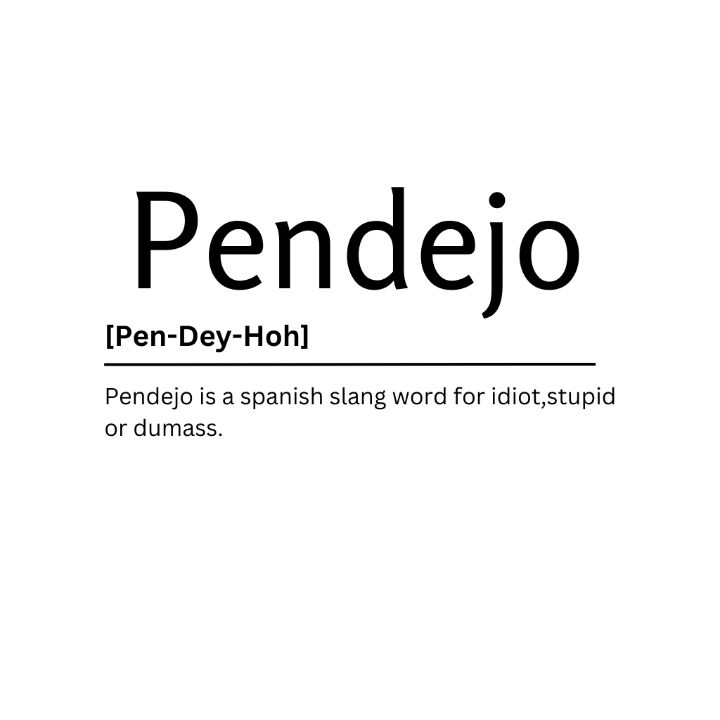Have you ever heard someone say "pendejo" and wondered what it means? Well, buckle up because we’re diving deep into this Spanish slang and its English equivalents. Whether you're trying to understand the word or looking to spice up your vocabulary, this guide has got you covered. So, let’s break it down and uncover the secrets behind "pendejo" and how it translates into English.
Let’s be real, language is all about context. "Pendejo" is one of those words that can mean different things depending on where you are, who you're talking to, and even the tone of your voice. It’s not just a simple translation from Spanish to English—it’s a cultural phenomenon. So, if you're ready to level up your language game, stick around because we’re about to drop some serious knowledge.
Before we dive into the nitty-gritty, let’s clear the air. This isn’t just another boring language lesson. We’re going to explore the nuances, the history, and the real-world applications of "pendejo." By the end of this, you’ll be able to drop this word like a pro and understand exactly what it means in any given situation. Ready? Let’s go!
Read also:Buscar Kid And Mom
What is Pendejo?
First things first, what exactly is "pendejo"? In its most basic form, "pendejo" is a Spanish slang term used to describe someone who is foolish, clueless, or acting dumb. But here’s the twist—it’s not always negative. Depending on the context, it can be playful, teasing, or even endearing. Think of it as the Spanish equivalent of calling someone a "dummy" or "numbnuts" in English, but with a whole lot more flair.
Now, here’s where it gets interesting. The word "pendejo" originally comes from the Latin word "pilus," which means "hair." Over time, it evolved to refer to someone who is immature or inexperienced, kind of like a baby goat or a "kid" in the animal kingdom. So, when someone calls you a "pendejo," they might be saying you’re acting like a clueless newbie. Ouch, right?
But wait, there’s more. The meaning of "pendejo" can shift dramatically depending on the tone and the relationship between the people using it. In some circles, it’s a term of endearment, like when a friend teasingly calls another friend a "pendejo" because they did something silly. In other contexts, though, it can be downright offensive. It’s all about reading the room and understanding the vibe.
Pendejo in English: Common Translations
So, what’s the best way to translate "pendejo" into English? Well, it depends on the situation. Here are some of the most common translations:
- Dummy: This is a pretty straightforward translation. If someone calls you a "pendejo," they might be saying you’re acting like a dummy or an idiot.
- Idiot: Another common translation, especially when "pendejo" is used in a more serious or negative context.
- Numbskull: A bit more playful, this one works well when "pendejo" is used in a teasing manner.
- Slacker: Sometimes, "pendejo" can refer to someone who’s lazy or not putting in the effort. In this case, "slacker" is a good fit.
- Goofball: If the tone is light-hearted and friendly, "goofball" might be the best translation.
As you can see, the translation isn’t always cut and dry. It’s all about understanding the context and the relationship between the people involved. So, next time you hear "pendejo," take a moment to assess the situation before reacting.
Regional Differences in Meaning
Now, here’s where things get even more fascinating. The meaning of "pendejo" can vary depending on where you are in the Spanish-speaking world. For example:
Read also:Xnnn
- Mexico: In Mexico, "pendejo" is often used in a more lighthearted or playful way. It’s not uncommon for friends to tease each other by calling each other "pendejos."
- Spain: In Spain, the word tends to have a more negative connotation. It’s often used to describe someone who is truly foolish or clueless.
- Colombia: In Colombia, "pendejo" can mean both "fool" and "immature." It’s often used to describe someone who’s acting childish or irresponsible.
- Argentina: In Argentina, the word is less common, but when it is used, it tends to have a more aggressive tone.
So, if you’re traveling or communicating with people from different Spanish-speaking countries, keep in mind that the meaning of "pendejo" might change depending on where you are.
How to Use Pendejo in English Conversations
Now that we’ve covered the basics, let’s talk about how to actually use "pendejo" in English conversations. First off, it’s important to remember that this is a slang term, so it’s not something you’d use in a formal setting. Stick to casual conversations with friends or people you know well.
Here are a few examples of how you might use "pendejo" in English:
- Playful Teasing: "Dude, you left your keys in the fridge again. You’re such a numbskull!"
- Critical Comment: "I can’t believe you fell for that scam. What an idiot!"
- Light-Hearted Joke: "You’re acting like such a goofball today!"
Remember, the key is to pay attention to the tone and the context. If you’re unsure, it’s always better to err on the side of caution and avoid using the word altogether.
When Not to Use Pendejo
While "pendejo" can be a fun and playful word, there are definitely times when it’s best to avoid using it. For example:
- In Formal Settings: Don’t call your boss a "pendejo" during a meeting. Trust me, it won’t end well.
- With Strangers: Unless you’re absolutely sure the other person will take it as a joke, it’s best to steer clear of using "pendejo" with people you don’t know well.
- In Serious Situations: If someone’s feelings are hurt or the situation is tense, avoid using slang terms like "pendejo." Stick to more neutral language instead.
In short, use your best judgment and always consider the context before dropping this word into a conversation.
The History of Pendejo
Let’s take a quick trip back in time to explore the origins of "pendejo." As we mentioned earlier, the word comes from the Latin "pilus," which means "hair." Over time, it evolved to refer to someone who is immature or inexperienced, kind of like a baby goat. In fact, in some Spanish-speaking countries, "pendejo" is still used to refer to a young goat or sheep.
But how did this word make its way into everyday language? Well, like many slang terms, "pendejo" started out as a playful insult among friends and gradually worked its way into the broader lexicon. Today, it’s one of the most commonly used slang words in Spanish, with meanings that range from playful to downright offensive.
It’s worth noting that the word has evolved over time, and its meaning can vary depending on the region and the cultural context. So, while "pendejo" might be a harmless joke in one place, it could be a serious insult in another. Fascinating, right?
Pop Culture References
Pop culture has played a big role in popularizing the word "pendejo." From movies to music to TV shows, this slang term has made its way into the mainstream. Here are a few examples:
- Netflix Series: If you’ve ever watched a Spanish-language show on Netflix, chances are you’ve heard the word "pendejo" thrown around a few times. It’s a staple in many dramas and comedies.
- Music Lyrics: Latin music is full of slang, and "pendejo" is no exception. You’ll find it in everything from reggaeton to bachata to salsa.
- Comedy Sketches: Comedians love to use "pendejo" in their routines, often playing on its double meanings and cultural nuances.
These pop culture references have helped to cement "pendejo" as a part of everyday language, both in Spanish-speaking countries and beyond.
Is Pendejo Offensive?
This is a question that comes up a lot when people first encounter the word "pendejo." Is it offensive? Well, the answer is… it depends. In some contexts, "pendejo" is a harmless joke. In others, it can be a serious insult. It all comes down to tone, intent, and cultural context.
For example, if you’re hanging out with a group of friends and someone makes a silly mistake, calling them a "pendejo" might be seen as playful teasing. But if you’re in a formal setting or dealing with someone you don’t know well, using the word could be seen as rude or disrespectful.
The key is to pay attention to the situation and the people involved. If you’re unsure, it’s always better to err on the side of caution and avoid using the word altogether. After all, it’s better to be safe than sorry!
How to Know If You’re Being Offensive
So, how can you tell if you’re being offensive when you use "pendejo"? Here are a few things to watch out for:
- Tone of Voice: If your tone is sarcastic, angry, or mocking, chances are the word will come across as offensive.
- Relationship: Are you close with the person you’re speaking to? If not, it’s probably best to avoid using slang terms like "pendejo."
- Cultural Context: Remember that the meaning of "pendejo" can vary depending on where you are and who you’re talking to. Do your research and be mindful of cultural differences.
By paying attention to these factors, you can avoid accidentally offending someone with this slang term.
Alternatives to Pendejo
If you’re worried about offending someone with "pendejo," there are plenty of alternative words you can use instead. Here are a few options:
- Clueless: This one works well in a more neutral context. "You’re acting so clueless today!"
- Silly: A great option for light-hearted teasing. "You’re being so silly!"
- Naive: If you want to emphasize someone’s lack of experience, "naive" is a good choice. "You’re so naive sometimes!"
- Goof: Another playful option. "You’re such a goof!"
These alternatives can help you convey the same meaning as "pendejo" without running the risk of offending someone.
When to Use Alternatives
So, when should you use these alternatives instead of "pendejo"? Here are a few situations where it might be a better choice:
- Formal Settings: If you’re in a professional environment, it’s always better to stick with more neutral language.
- With Strangers: Unless you’re absolutely sure the other person will take it as a joke, it’s safer to use a more neutral word.
- In Serious Conversations: If the topic is sensitive or the situation is tense, avoid using slang altogether.
By choosing the right word for the situation, you can avoid any potential misunderstandings or hurt feelings.
Conclusion
And there you have it, folks! A comprehensive guide to "pendejo" and its English equivalents. Whether you’re looking to understand the word better or trying to spice up your vocabulary, this guide has got you covered. Remember, language is all about context, so always pay attention to the tone, the relationship, and the cultural context before using slang terms like "pendejo."
So, what’s next? Why not share this article with your friends


